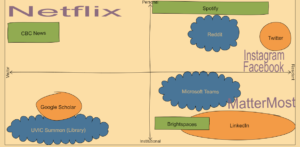How diverse is your existing PLN?
I would assess my existing PLN as fairly diverse. I am well-connected on social media platforms and PLNs like LinkedIn with a diverse array of folks from various backgrounds. I grew up in a small city where there is not very much diversity and I felt out of place as a BIPOC woman growing up. As I have gotten older, I learned to value multiculturalism as something to be celebrated, and seek it out in my personal and professional settings. I would say this has become second nature to me. Even in the media I consume, I most enjoy movies and books that show diversity in their stories.
In your PLN, are you learning from a variety of voices or are you the loudest in the room?
I am definitely learning from a variety of voices; however, as an introvert, I do not think I am ever the loudest in the room. Something that has come up in discussions regarding Black Lives Matter and other social justice movements is the importance of listening to marginalized folk. Instead of centering my own views and opinions, I always try to listen to those who are different from me, and be mindful of people who have had different experiences than I have before making assumptions. I think that this is important in movements for inclusion as well. When we try to include those who have not been welcome in certain spaces before, such as in educational institutions as Moore discusses in our readings and videos, we must listen to those who have lived experience being excluded.
Do you participate in a silo of information sharing (similar themes or wide-range of interests)?
I try my best to avoid echo chambers and only exposing myself to views that I already agree with. I am someone who is constantly pushing myself to grow and broaden my horizons, so I always endeavour to learn new things. However, that is not to say that I have not fallen into silos of information sharing before. Overall, this relates back to listening with intent to understand, as I outlined previously.
How can you use a diverse PLN to broaden your views of inclusion?
A diverse PLN can help broaden views of inclusion by its ability to introduce new ideas you may have not been exposed to before. For instance, as someone who grew up in a town that was not diverse, I used PLN to make multicultural connections. I was able to learn more about movements about issues not directly impacting me, such as LGBT rights and disability rights. PLNs offer an accessible entry-point to inclusion, and is especially significant during this pandemic-era where it is harder to connect with new people.
In your professional setting of choice, do you think inclusion is actively embraced?
As someone who wants to become a lawyer, I have reflected on this question before. Historically, I do not think inclusion in law was actively embraced, and the field still has a reputation for being relatively male and white-dominated space. However, things are changing. More women and more BIPOC individuals are entering the field, and women actually make up a higher percentage of law school graduates (CITE). There is still so much room for improvement, which is why I am attending an event by the UVIC Students of Colour Collective that addresses this very topic (see photo below).

Educational institutions, like law schools, work in the manner that Moore criticizes for producing “more of the same”, dating back to attitudes formulated during the industrial revolution (9). Our workforce needs people to work certain hours per day and to not question the systems that are in place. I believe there are ways to subvert this trend. We can encourage educational reforms, which Moore notes are already happening in a global scale (9). Personally, I have noticed a greater emphasis on decolonizing education in recent years of study, which I think is an overall reflection of inclusive efforts.
What is the learning outcome of your PLN and how are you ensuring your exposure to diversity and inclusion?
The learning outcome of my PLN is personal and professional development. Rather than focusing on accomplishments or achievement markers, I believe individual self growth is a worthwhile ambition. For myself, a goal of mine has been to incorporate more rest and self-care into my daily routine. This learning outcome has been, in part, inspired by exposure to diverse views on my PLN. I will continue to ensure my PLN reflects a diversity of opinion.
In terms of inclusion, I will ensure that anything I post or include in my PLN is not exclusionary to any group or practice. I will also continually remind myself that, as Moore states “There is no one way of being inclusive,” (11).
How has your thinking about inclusion and PLN evolved after reviewing the videos and readings?
After reviewing this topic through the videos and readings, I have become much more aware of the efforts made by activists, advocacy groups, etc, to promote inclusion. The move from integration to inclusion (Five Moore Minutes 03:13) is a process that resonated with me deeply. I have definitely felt the difference between feeling like a token minority in a community and feeling actively and meaningfully included. This difference is key to understand to make sure that no one feels excluded.
I also really appreciated the example Moore used about people who do not feel “green” may feel broken (Five Moore Minutes 01:57). This made me further reflect on how the standards in place in our society can have such negative impact.
Works Cited
Moore, Shelley. One Without the Other : Stories of Unity Through Diversity and Inclusion, Portage & Main Press, 2017. ProQuest Ebook Central, https://ebookcentral-proquest-com.ezproxy.library.uvic.ca/lib/uvic/detail.action?docID=4832579.
Moore, Shelley. “Don’t Should on Me: It’s Not Easy Being Not Green.”YouTube, uploaded by Five Moore Minutes, 2018, https://www.youtube.com/watch?v=MeRNhz0nGts&ab_channel=FiveMooreMinutes
Moore, Shelley. “The Evolution of Inclusion.” YouTube, uploaded by Five Moore Minutes, 2018, https://www.youtube.com/watch?v=PQgXBhPh5Zo&feature=youtu.be&ab_channel=FiveMooreMinutes

Recent Comments